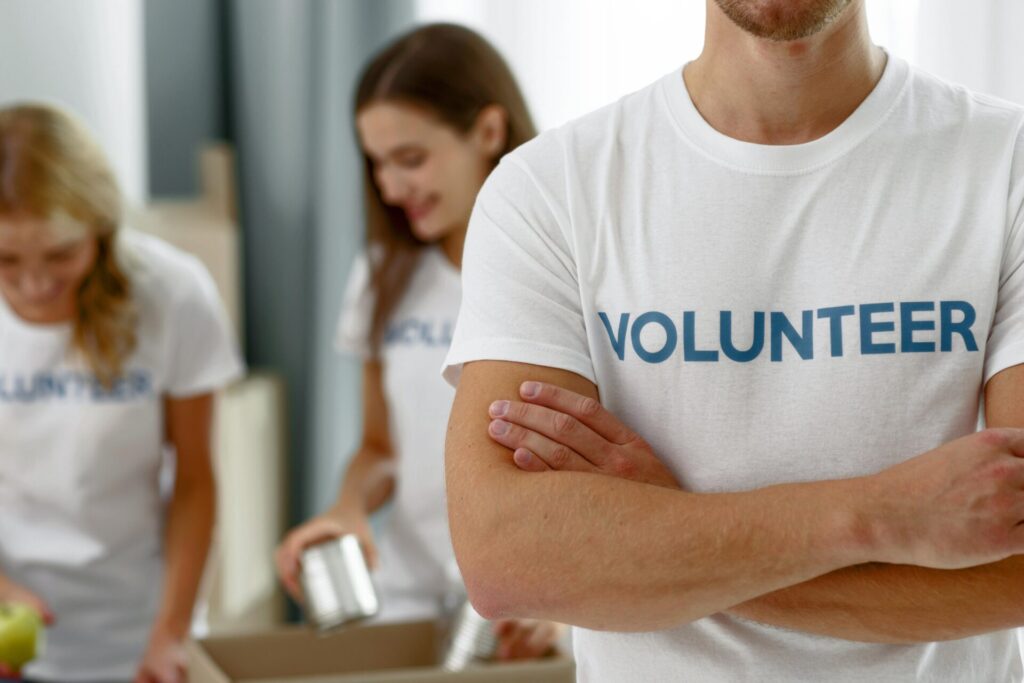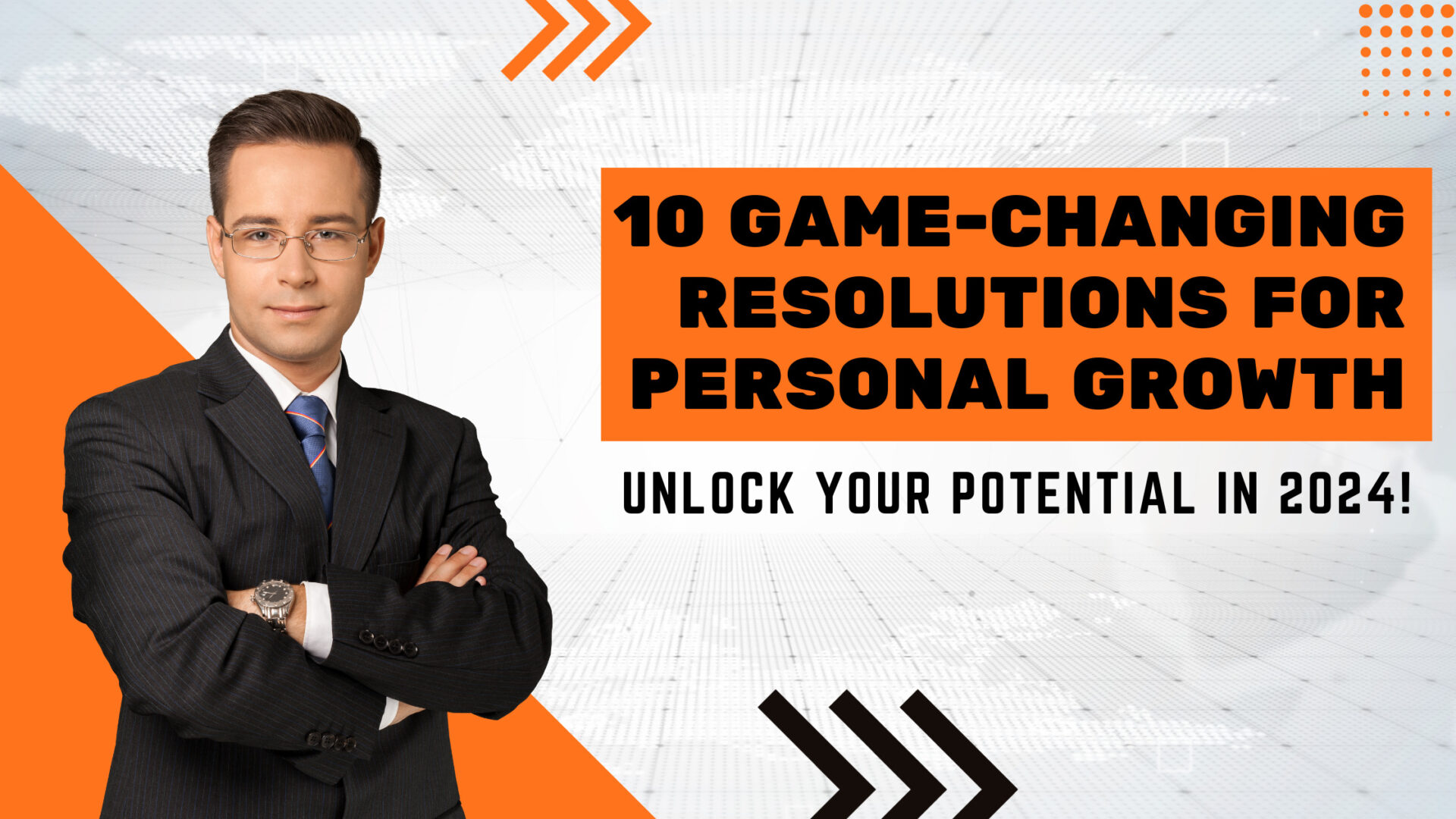10 Game-Changing Resolutions for Personal Growth: Unlock Your Potential in 2024!
Contents
- 1 10 Game-Changing Resolutions for Personal Growth: Unlock Your Potential in 2024!
- 1.1 Introduction
- 1.2 1. Cultivate a Reading Habit:
- 1.3 2. Embrace Lifelong Learning:
- 1.4 3. Master a New Skill:
- 1.5 read more posts
- 1.6 4. Step Out of Your Comfort Zone:
- 1.7 5. Prioritize Mental Health:
- 1.8 6. Network and Connect:
- 1.9 read more posts
- 1.10 7. Volunteer and Give Back:
- 1.11 8. Practice Time Management:
- 1.12 9. Seek Constructive Feedback:
- 1.13 read more posts
- 1.14 10. Reflect and Adapt:
- 1.15 read more posts
- 1.16 Conclusion
- 1.17 read more posts
- 1.18 FAQs
- 1.19 read more posts
Read DISCLAIMER
Unlock your potential in 2024 with these 10 transformative resolutions for personal growth. Embrace learning, new skills, and self-improvement for a fulfilling year ahead!
Introduction

Setting off on the path of self-improvement is like unlocking a world of infinite possibilities. Every year at the beginning of a new year, the canvas of life calls, demanding that we fill it with the vivid brushstrokes of development, education, and self-discovery. The quest to become the finest version of oneself is an invitation to go on a journey that is more than just a passing fad.
The promise of new beginnings is the driving force behind making personal development resolutions at the start of a new year. This is a momentous occasion, full with possibilities for change. This is our opportunity to take hold of our inner potential and direct it into pursuits that uplift our souls, intellects, and abilities.
The keystone of evolution—learning—is the lighthouse that illuminates this route. It’s about welcoming the strange, exploring undiscovered areas of knowledge, and accepting the unknown. It’s the dedication to learning new things, exploring uncharted territory, and honing abilities we already have—each step an investment in our own personal growth.
Imagine the plethora of ways these resolutions may come to pass as we approach the start of our adventure. Imagine learning to play a new language, falling in love with the calming rhythms of a musical instrument, or deciphering the complexities of code. Imagine the universe growing as you turn the pages of books, delving into many genres and points of view, each chapter deepening your comprehension of life.
However, the expedition’s intangible riches and physical talents are what really make it beautiful. It all comes down to daring to push our own boundaries and go beyond our comfort zones. In the face of difficulty, it is the bravery to face worries head-on, to fall and get back up, and to cultivate resilience.
These aren’t just check boxes; these resolutions are forces that encourage personal transformation. Their call is for us to give our mental health first priority and to heal our souls via gratitude, mindfulness, and meditation. Their tales, experiences, and insights enliven our own, and they implore us to network and engage with them.
They also promote service, which involves giving of our time and talents and planting seeds of compassion and transformation in the world. They emphasize the value of asking for feedback and accepting criticism as a necessary step toward improvement rather than as a point of judgment.
But in between these goals is when flexibility and introspection come into play. These resolutions are guiding concepts, not inflexible dogma, designed to change as we do. They force us to stop, consider our course, realign our direction, and go on with fresh strength and clarity.
These resolutions are essentially a road plan for self-discovery, a tapestry weaved together with strands of commitment, curiosity, fortitude, and empathy. They stand for the dedication to lifelong learning, the bravery to venture into unknown territory, and the everlasting faith in our ability to advance.
Therefore, let these resolutions be your traveling companions as we set out on this adventure together, providing illumination along the way as we pursue our unwavering goal of being the masters of our own destiny and find personal fulfillment.
1. Cultivate a Reading Habit:

Getting into the habit of reading is like unlocking a door to an endless supply of information, viewpoints, and creativity. Books are irresistible not just because of their content but also because of their capacity to take us beyond borders and into uncharted territories.
Reading is an investment in oneself; it’s a conscious choice to take time out of our hectic schedules to read and become engrossed in the knowledge and tales that are contained between the pages. It involves more than just reading words; it involves delving into concepts that excite, challenge, and demand thinking.
There is nothing like reading to extend one’s horizons. Exploring many genres—fiction, non-fiction, self-help, science fiction, biographies, historical narratives, and more—opens doors to a variety of ideas, feelings, and worlds. Every book turns into a container for ideas that are just waiting to be realized, viewpoints that are ready to be accepted, and information that is just waiting to be processed.
Choosing to read a certain number of books or set aside a certain amount of time every day to read creates a routine and a rhythm that improves our lives. It’s the conscious decision to look for comfort in the words, for answers, or maybe just to enjoy the narrative for its own sake.
Furthermore, this dedication develops a habit that permeates our daily lives and goes beyond the simple act of reading. It nourishes our brains, piques our interest, and makes us more intelligent. It enables us to adopt new perspectives, feel sympathy for people, and draw lessons from the victories and setbacks shown in stories.
Reading fosters empathy, emotional intelligence, and critical thinking in addition to information gain. It sharpens our comprehension of the subtleties of human emotions and behavior by challenging preconceptions, examining events from several angles, and empathizing with characters’ struggles.
Furthermore, reading regularly has advantages that go beyond cerebral growth. Reading has been shown in studies to lower stress, increase vocabulary, boost attention and concentration, and even improve sleep.
Essentially, developing a reading habit involves more than just ingesting words; it involves setting out on a journey that promotes growth, self-discovery, and a better comprehension of both the outside world and ourselves. It’s about accepting that books have the ability to change our thoughts, feed our souls, and light our pathways to enlightenment and satisfaction on a personal level.
2. Embrace Lifelong Learning:

Accepting everlasting learning is a tribute to the never-ending pursuit of knowledge, development, and self-improvement. It’s the recognition that education is a journey that takes us over the wide terrain of inquiry and discovery throughout our lives, and that it goes far beyond the walls of traditional schools.
Participating in virtual workshops, seminars, or courses opens doors to an abundance of learning options that beyond conventional limits. Coursera, Udemy, Khan Academy, and several other platforms have made education more accessible by providing a wide range of courses that suit a wide range of interests, passions, and goals.
These platforms’ versatility and ease of use are what make them so beautiful. They invite us to learn more about topics that pique our interest, whether it’s investigating philosophy, understanding the finer points of cookery from a foreign culture, learning a new language, or even diving into the world of quantum physics.
Accepting the multidimensionality of knowledge is the essence of lifelong learning; it transcends specialization. It is about stepping into unknown waters, accepting the difficulty of learning new things, and savoring the excitement of picking up novel abilities and insights.
The adventure itself is the reason we enroll in these courses, not only to add certifications to our resumes. It involves questioning our preconceptions, broadening our views, and fully immersing ourselves in the learning process. Engaging with educators and students from across the world creates a rich tapestry of perspectives, ideas, and experiences.
Furthermore, we are able to customize our educational experience to fit our schedules and tastes thanks to the flexibility of online learning. It fits the hectic schedules of working adults, parents, and everyone else trying to juggle education with other responsibilities. These platforms accommodate different learning styles and speeds, whether it’s an organized course with deadlines or a self-paced investigation.
Embracing lifelong learning has advantages that go far beyond knowledge gain. It encourages flexibility, resiliency, and a growth mindset—the conviction that obstacles present chances for progress, setbacks serve as springboards, and every experience gains wisdom.
In the end, adopting a lifelong learning mindset is a call to action—a luring cry to slake one’s curiosity, foster intellectual curiosity, and never stop reinventing oneself. It is a manifestation of the idea that learning is a lifetime journey rather than a destination, one that broadens our perspectives, improves our lives, and propels us on the path to satisfaction and self-actualization.
3. Master a New Skill:

Learning a new talent is an exciting adventure that challenges us to reach new heights in our potential, push the envelope of what we can do, and experience the transformational force of perseverance and devotion.
Developing our skills requires honest introspection, which is the first step in learning a new ability. The appeal of expressing ideas in a foreign language, the logical and imaginative connections found in code, the soul-stirring chords of a musical instrument, or the vivid brushstrokes of painting that beckon as a medium of expression might all be contributing factors.
Making the commitment to learn a skill is a vow to oneself to set out on a path of self-improvement and self-discovery, rather than just making a resolve. To fully explore the subtleties and complexities of one’s chosen art, one needs commitment, perseverance, and a sincere love for it.
Progress becomes anchored by consistency. Regular practice time—whether it’s an hour a day or designated days for concentrated learning—builds competency by establishing a routine. The quality of practice—an purposeful engagement that explores the subtleties, hones methods, and promotes improvement—is more important than the amount of time spent.
Monitoring our advancement turns into a compass that leads us on this adventure. It serves as a mirror, showcasing our accomplishments, reflecting our development, and providing feedback on areas in need of improvement. Every accomplishment—whether it’s writing code, mastering musical scales, improving verbal fluency, or perfecting brush strokes—confirms the benefits of perseverance.
There are many obstacles on the way of mastery. There are frustrating times, obstacles to go beyond, and roadblocks that put our commitment to the test. But it’s in these times when tenacity proves to be our most valuable ally. The path to mastery is fueled by perseverance in the face of difficulty, seeing failures as teaching opportunities, and asking for advice from resources or mentors.
Beyond only learning the talent, this trip imparts priceless values. It develops endurance, self-control, fortitude, and a growth mentality—the knowledge that development is a continuum and that every advancement, no matter how tiny, adds to the overall picture of skill.
In the end, acquiring a new talent is more than just a process; it’s a sign of our ability to develop, our desire for development, and our unwavering quest of perfection. It’s a tribute to the wonder of human potential, capturing the excitement of change and the satisfaction that comes from seeing our capacities grow and change.
read more posts
4. Step Out of Your Comfort Zone:

Leaving our comfort zones behind is a call to action: it’s an invitation to set out on a life-changing journey that defies familiarity and ushers us into a world of development, resiliency, and self-discovery. It’s an admission that when we face our anxieties, welcome discomfort, and explore new areas of our experiences, we make the biggest advancements.
The comfort zone is a metaphor for the place where habits and familiarity rule—a haven free from unknowns and difficulties. But progress is found outside its borders, in the uncharted areas that frighten and unnerve. There are plenty of prospects for personal growth in these unexplored areas.
Pushing these limits is like taking a leap of faith; it’s a conscious decision to face your anxieties, whether they are related to public speaking, picking up a new skill, striking up a conversation with a stranger, or taking on a project that seems overwhelming. It’s about accepting discomfort as a growth-promoting factor instead of a turnoff.
Venturing outside one’s comfort zone has the power to cultivate resilience. Every step we take out from our comfort zone builds resilience, fortifies our ability to handle obstacles, and increases our determination. It’s the realization that discomfort is an opportunity to grow rather than a warning to back down.
Additionally, accepting discomfort creates opportunity and new viewpoints. It opens our eyes, exposes us to other situations, and reveals aspects of ourselves that we would not have known when living in familiar surroundings. It’s an investigation into our own potential—a finding of latent qualities, aptitudes, and abilities that are just waiting to be revealed.
Stepping outside of one’s comfort zone might be uncomfortable, but it also serves as a catalyst for personal growth. It encourages a growth mentality, which is the belief that obstacles are opportunities for improvement, failures are teaching opportunities, and setbacks are lessons. It builds the resilience required to bravely and nimbly negotiate life’s challenges.
Although stepping outside of your comfort zone might be difficult, the benefits are enormous. It’s a trip that alters our perspectives, gives us the confidence to face challenges head-on, and accelerates our development into more flexible, self-assured, and resilient people.
Essentially, venturing outside our comfort zones is a celebration of the human spirit’s ability to evolve rather than just a show of bravery. Choosing to welcome discomfort as a traveling partner on our path to self-actualization, growth, and the unwavering pursuit of our greatest potential is a deliberate choice.
5. Prioritize Mental Health:

Setting mental health as a top priority in the context of personal development is evidence of the deep realization that resilience and emotional balance, in addition to physical and intellectual aptitude, are essential components of true well-being. In the intense quest for self-improvement, promoting mental health stands out as a crucial pillar.
Yoga, meditation, and mindfulness aren’t just exercises; they’re doorsway to cultivating a positive outlook. By practicing mindfulness, which is the skill of being in the present moment without passing judgment, we may develop an awareness of our thoughts, feelings, and sensations. Ancient wisdom-based meditation provides a safe haven for mind-quieting, inner serenity, and developing a better sense of self. Yoga is a comprehensive practice that integrates the mind, body, and spirit. It promotes balance and harmony.
Including these routines in our everyday lives turns them into a self-care commitment to support our mental and emotional health. It’s about finding time in our busy lives to stop, take a deep breath, and realign. By bringing us back to the present and providing a break from the swirl of thoughts and emotions, these practices provide comfort in the midst of stress.
When necessary, seeking professional assistance is a sign of self-awareness and self-compassion. Seeking help for our mental health is an investment in our entire development, just as we do to improve our physical health or learn new skills. In order to help us manage the complexity of our inner lives and build resilience, mental health specialists provide vital tools, techniques, and insights.
It is impossible to exaggerate the significance of mental health in relation to personal development. The foundation for all other aspects of progress is a sound mental state. It’s the mental clarity that enables us to make plans and work toward them, the emotional stability that helps us deal with difficulties, and the resilience that gives us the strength to recover from failures.
Making mental health a priority isn’t a luxury; rather, it’s a need—a cornerstone that keeps us moving forward on the path of personal growth. It’s about realizing that our brains require the same loving, care, and attention as our bodies. It’s an admission that having a positive outlook on life is not just helpful but necessary for reaching our greatest potential and living happy, satisfying lives.
6. Network and Connect:

Building relationships and networking is not only a social construct; it is also a powerful driver of personal development, providing access to a wealth of information, experiences, and growth prospects that go beyond simple exchanges.
Making relationships with people who challenge and inspire us is like adding threads to the fabric of our life. It involves looking for peers, mentors, and people whose experiences, viewpoints, and stories align with our goals. These relationships act as cornerstones of encouragement, sources of motivation, and inducers of human development.
Making connections with others through seminars, groups, or online communities that share our interests fosters a positive environment for these relationships to grow. It’s a deliberate move in the direction of building a network that supports our development and ignites our interests. These platforms provide spaces for social interaction as well as forums for knowledge exchange, experience-based learning, and exposure to a variety of viewpoints.
Interacting with people from different disciplines and backgrounds opens up a world of opportunities. It challenges our prejudices and opens our minds to a wide range of ideas, opinions, and experiences. These exchanges work as a blank canvas for fresh concepts, encouraging originality and creativity.
Furthermore, these relationships provide benefits beyond only acquiring knowledge. They promote understanding, empathy, and a feeling of belonging. Interacting with different viewpoints improves our emotional intelligence and interpersonal abilities while helping us to understand the world’s intricacies on a deeper level.
These relationships are valuable because they involve a reciprocal exchange of experiences, wisdom, and support in addition to what we give. These connections provide us with chances for cooperation, mentoring, and group development.
In the end, networking and establishing connections with people who motivate and inspire us is an essential step on the path to personal growth and fulfillment rather than merely a means to an end. It involves creating a web of connections with people who act as mentors helping us overcome obstacles, friends enhancing our personal development, and mirrors reflecting our goals. These relationships end up serving as the threads that bind our lives together, weaving a tapestry of common experiences, lessons learned, and life-changing events.
read more posts
7. Volunteer and Give Back:

Giving back to the community and volunteering are not only acts of kindness; they are a profound journey of self-awareness, compassion, and enrichment; a route that goes beyond individual goals to embrace a shared vision of bringing about good change.
The understanding that our acts, no matter how tiny, have the potential to ripple through society and leave a lasting influence is the core of contributing to a cause bigger than oneself. We may actualize our values, ideals, and ambitions for a better society by giving our time and talents to organizations that share our convictions.
This service is a journey of transformation within; it is not only about the outward effects. It’s a chance to leave our own life behind and fully immerse ourselves in the needs and experiences of others. It encourages empathy, or the capacity to comprehend the many viewpoints, difficulties, and realities that exist outside of our local environment.
Additionally, volunteering fosters thankfulness, or an awareness of our privileges and benefits in relation to the struggles endured by others. It’s a humble experience that extends our perspectives, widens our views, and fosters a greater appreciation for all that we have in life.
Giving back is an exchange; it is a mutually beneficial transaction that helps both the donor and the beneficiaries. It fosters a sense of fulfillment—a deep sense of satisfaction that comes from genuinely improving the lives of others. This satisfaction goes beyond transient feelings and turns into an internal source of motivation that propels us to keep supporting causes that align with our beliefs.
Additionally, volunteering provides a means of developing one’s skills and self. It offers chances to develop new abilities, polish current ones, and work with diversified teams, all of which contribute to the development of a sense of competence and purpose.
Beyond these particular advantages, volunteering has an incalculable overall influence. across addressing social challenges, promoting diversity, and cultivating a culture of compassion and support, it causes good change to ripple across communities.
Essentially, helping others and contributing to the community are not only charitable deeds; rather, they are life-changing events that mold our personalities, enhance our quality of life, and add to a shared history of compassion and unity. It involves realizing how interrelated we are and directing our efforts toward fostering an environment that fosters empathy, compassion, and constructive change.
8. Practice Time Management:

Task scheduling is only one aspect of effective time management; it’s a deeper tactic that enables us to maximize our days, boost output, and create specific areas for development and self-improvement. It’s the skill of balancing our pursuit of our goals with life’s obligations.
Using time-management strategies such as the Eisenhower Matrix or the Pomodoro Technique turns them into a compass that helps us navigate the maze of everyday obligations. The Pomodoro Technique encourages continuous attention and fights procrastination with its planned intervals of intense work interspersed with brief breaks. By helping to divide work into digestible portions, it promotes productivity and keeps burnout at bay.
The Eisenhower Matrix divides jobs into four quadrants according to their importance and urgency. It was developed in response to Dwight D. Eisenhower’s wisdom. It enables us to set priorities for our jobs, determining which ones need to be completed right now and which ones may wait, be assigned, or be deleted. This approach brings clarity and directs us to focus our time and efforts on projects that support our aspirations for personal development.
Effective time management establishes a structure that guarantees the accomplishment of everyday assignments and also generates dedicated areas for education, personal development, and following our interests. It’s about setting out certain time slots for learning new things, reading, taking classes, or doing things that feed our brains and spirits.
Furthermore, learning how to manage your time well requires accountability and discipline. It gives us a sense of control over our time, enabling us to set priorities and make thoughtful decisions that are in line with our long-term goals. It fosters a proactive mindset by guiding us away from distractions and procrastination traps.
Effective time management has advantages that go beyond increased output. It fosters a sense of balance by harmonizing personal, professional, and developmental goals. It ensures that time spent on growth and self-improvement is sustainable and satisfying by fostering a healthy routine that wards against burnout.
In the end, time management is a philosophy—a way of thinking that respects time as a limited and valuable resource—rather than merely a technique. It’s an investment in our own personal development, enabling us to deal with life’s challenges with efficiency, intention, and a resolute commitment to ongoing development and progress.
9. Seek Constructive Feedback:

Asking for constructive criticism is like opening a treasure mine of knowledge and growth prospects. It’s a deliberate and brave move in the right direction—a realization that criticism, good or bad, is a fuel for improvement and development.
Feedback acts as a mirror, reflecting back to us our performance, habits, and actions. Accepting constructive criticism, which points out areas for progress, as well as positive feedback, which affirms our efforts and abilities, becomes essential to our development as self-aware individuals.
Asking for advice in areas we want to do better from experts, peers, or mentors is a conscious decision to bring other viewpoints and levels of experience into our development process. It’s about interacting with people whose perspectives and experiences may provide insightful advice, mentorship, and assistance.
Feedback becomes a tool for development when it is accepted as chances for improvement rather than as criticism. It’s a deliberate choice to see comments as a guide for improvement rather than as a means of passing judgment. With its precise guidance and suggestions for improvement, constructive criticism serves as the foundation for our personal development and helps us reach our goals of mastery.
Furthermore, asking for input encourages humility and openness—the readiness to own our flaws and the dedication to lifelong growth. It fosters a culture of growth, a secure environment where criticism is valued, appreciated, and used as a platform for advancement.
Resilience is the ability to take criticism well and move past it without letting it make you feel less worthy of yourself. It’s realizing that criticism is a tool to help us improve and become the greatest versions of ourselves, not a reflection on our worth as people.
There are several advantages to asking for constructive criticism. It speeds up skill development, promotes a culture of continual improvement, and catalyzes both professional and personal progress. It fosters a development attitude, which recognizes that failures and criticisms are chances for improvement.
In the end, asking for helpful criticism is a crucial component of the growing process. It’s evidence of our humility, our dedication to personal development, and our proactive pursuit of becoming more skilled, competent, and adaptive people. It’s about accepting criticism as a companion on the road to greatness, one that helps us reach our greatest potential.
read more posts
10. Reflect and Adapt:

The two cornerstones that support the process of personal growth are reflection and adaptation. It is a dynamic, iterative process that depends on self-reflection, adaptability, and a firm dedication to continuous progress.
Frequent review of progress is like stopping along the path to take stock; it’s a purposeful and intentional introspection that enables us to recognize turning points, celebrate successes, and accept the lessons we’ve learned. It involves setting aside time for introspection during which we evaluate our deeds, attitudes, and the course of our development in relation to our goals.
Not only is it important to acknowledge accomplishments, but it is also critical to pinpoint areas that require improvement. It’s an honest assessment that points out areas of strength as well as opportunities, problems, and gaps that need to be addressed and improved.
Throughout this trip, adaptability proves to be a vital companion—a quality that enables us to remain agile and sensitive to the changing terrain of our goals and circumstances. It’s the readiness to change course, reassess our goals, and modify our plans in light of new information obtained via introspection and evolving circumstances.
Being flexible is not a sign of waning devotion; rather, it is an indication of resilience—the ability to accept change, gain from setbacks, and adjust plans without losing sight of the main objective of personal development. It’s about realizing that the route to self-improvement is a mosaic of experiences that call for flexibility and agility rather than a straight line.
A growth mindset—an unshakeable conviction in our abilities to change, learn, and grow—enables the adaptation process. It’s seeing that obstacles are chances for improvement and reinvention rather than barriers caused by obstacles, difficulties, or shifts in circumstances.
Furthermore, maintaining one’s commitment to the growth path in the face of reflections and adjustments serves as the momentum-sustaining anchor. It’s the steadfast commitment to pursuing personal excellence—a devotion that, in the face of difficulty, overcomes barriers, builds resilience, and moves us ahead.
Essentially, thinking and changing are lifestyle choices that respect the cyclical pattern of development rather than only being acts. It’s about accepting the cadence of development, acknowledging successes, growing from missteps, and being flexible as we move toward becoming the designers of our own transformation. It is evidence of the strength that comes from self-awareness, fortitude, and an unwavering dedication to realizing our greatest potential.
read more posts
Conclusion
The process is just as important as the end point when it comes to personal development. As we come to the end of our investigation of resolutions meant to promote self-improvement, it is critical to understand that the road to progress is dynamic and complex. These resolutions are just meant to be a guide; what really matters is your dedication, persistence, and flexibility.
Recall that personal development is a marathon rather than a sprint, an ongoing process characterized by advancement, obstacles, and priceless lessons. Accept the suffering, celebrate the successes, and never give up on your goal of improving yourself. The resolutions listed here are tools, and the extent of your progress depends on how you use them.
May these resolutions serve as catalysts for change in the next year and beyond, opening doors to fresh viewpoints, possibilities, and personal growth. Enjoy your journey, absorb lessons from setbacks, and maintain an insatiable curiosity and resolve as you forge across the thrilling landscape of personal development. Let’s toast to a transformational and prosperous 2024!
read more posts
FAQs
1. How do I stick to my resolutions for personal growth?
– Setting specific, achievable goals, and staying accountable can help. Also, celebrate small wins to stay motivated.
2. Can I learn a new skill while working full-time?
– Absolutely! Allocate dedicated time each day or week, even if it’s just 15-30 minutes, to steadily progress.
3. What if I don’t know where to start with reading?
– Begin by exploring genres that interest you or recommended books in areas you wish to learn more about.
4. Are online courses effective for learning new skills?
– Yes, many platforms offer quality courses taught by experts. Research and read reviews to find ones that suit your learning style.
5. How can volunteering contribute to personal growth?
– Volunteering allows you to develop empathy, leadership skills, and a sense of fulfillment by giving back to the community.
6. What if I struggle to receive feedback?
– Approach feedback with an open mind. Constructive criticism helps you grow and improve.
7. Is it too late to start learning something new?
– It’s never too late! The journey of learning and growth knows no age limits.
8. How can I overcome procrastination in my learning journey?
– Break tasks into smaller, manageable parts and set deadlines. Also, eliminate distractions and create a conducive learning environment.
9. Do I need to set deadlines for my resolutions?
– Deadlines can provide structure, but it’s essential to set realistic timelines that allow for consistent progress without overwhelming yourself.
10. Can I pursue multiple resolutions simultaneously?
– While multitasking is possible, focusing on one or two resolutions at a time might yield better results.
11. Should I seek professional help for mental health while pursuing growth?
– Yes, taking care of your mental health is crucial. Seek professional support if needed; it’s a vital part of personal growth.
12. How can I track my progress with these resolutions?
– Maintain a journal or use apps to track your progress, jot down achievements, and reflect on areas for improvement.
13. Can networking really impact personal growth?
– Absolutely. Networking exposes you to diverse perspectives, opportunities, and knowledge.
14. What if I fail to keep up with my resolutions?
– Embrace setbacks as learning experiences. Adjust and continue with renewed determination.
15. How do I stay motivated throughout the year?
– Find a support system, visualize your goals, and remind yourself of the reasons why you embarked on this journey of personal growth.

Its like you read my thoughts! You appear to understand a lot about this, like you wrote the book in it or something.
I believe that you simply could do with some percent to
power the message house a little bit, however other
than that, that is excellent blog. An excellent read.
I will definitely be back.
Thanks, I have just been looking for information about this subject for a long time and yours is the best I’ve discovered till now. However, what in regards to the bottom line? Are you certain in regards to the supply?
Thank you for your sharing. I am worried that I lack creative ideas. It is your article that makes me full of hope. Thank you. But, I have a question, can you help me?
Thank you for your sharing. I am worried that I lack creative ideas. It is your article that makes me full of hope. Thank you. But, I have a question, can you help me?
Thank you, your article surprised me, there is such an excellent point of view. Thank you for sharing, I learned a lot.
Thank you for your sharing. I am worried that I lack creative ideas. It is your article that makes me full of hope. Thank you. But, I have a question, can you help me?
Thank you for your sharing. I am worried that I lack creative ideas. It is your article that makes me full of hope. Thank you. But, I have a question, can you help me? https://www.binance.info/en-IN/register-person?ref=UM6SMJM3
You have noted very interesting points! ps decent web site. “We simply rob ourselves when we make presents to the dead.” by Publilius Syrus.
I don’t think the title of your article matches the content lol. Just kidding, mainly because I had some doubts after reading the article.
Thank you for your sharing. I am worried that I lack creative ideas. It is your article that makes me full of hope. Thank you. But, I have a question, can you help me?
**mitolyn official**
Mitolyn is a carefully developed, plant-based formula created to help support metabolic efficiency and encourage healthy, lasting weight management.
Your article helped me a lot, is there any more related content? Thanks!